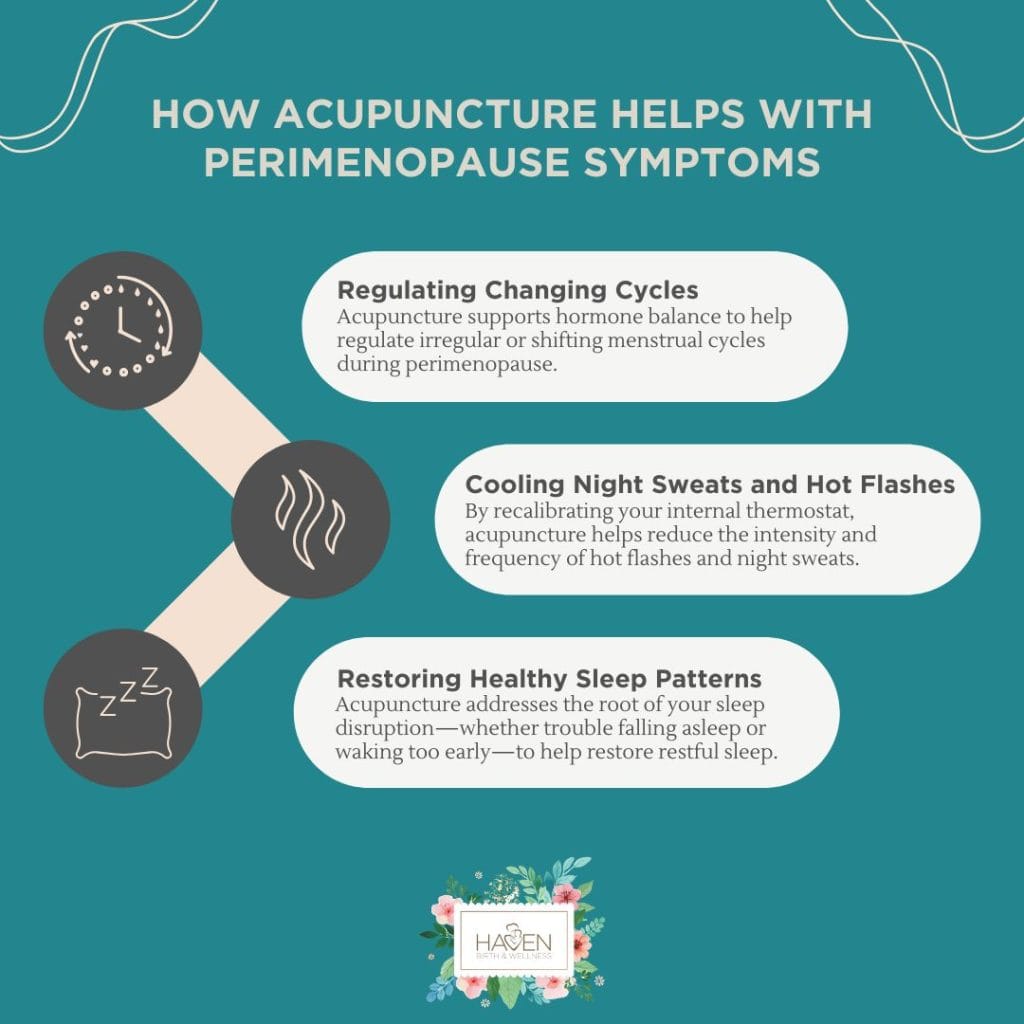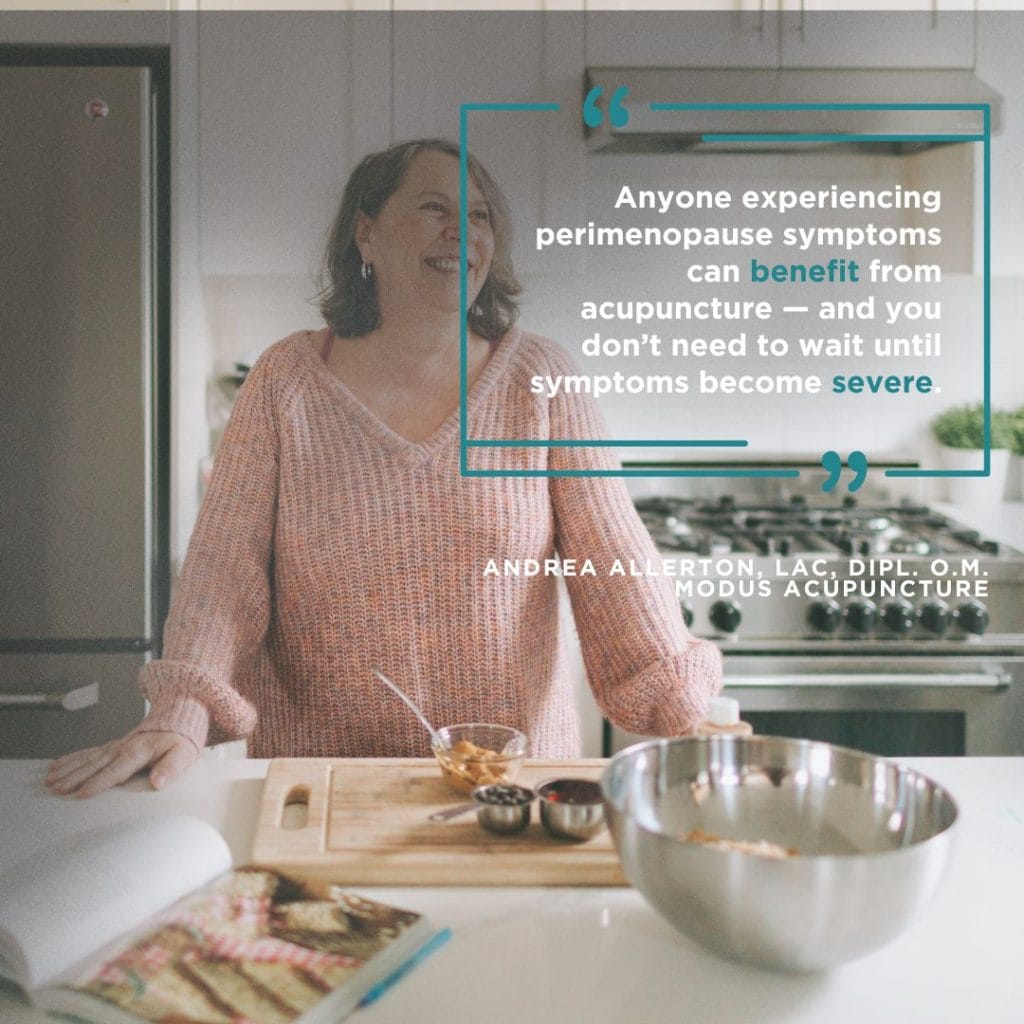

If you’re in your 30s or 40s and noticing suspicious changes in your body — disrupted sleep, irregular cycles, mood swings, hot flashes — you’re not alone. These are hallmark signs of perimenopause, the transitional phase before menopause that can begin up to a decade earlier than many expect.
Acupuncture for perimenopause offers a supportive, holistic approach to navigating this era of change by helping the body find balance. As women, we often find ourselves pushing through symptoms or normalizing discomfort, but acupuncture invites us to pause, listen to our bodies, and restore harmony.
Why Acupuncture Helps During Perimenopause
At its core, acupuncture is about bringing the body into balance, or homeostasis.
When people first encounter acupuncture, it can feel mysterious. How could a few tiny needles bring so much relief? But when you consider the body’s interconnectedness, it begins to make sense.
Your body has 12 main “highways,” which we call meridians, that run from your head to your feet, each corresponding to a specific organ system like the liver, spleen, stomach, or large intestine. When there’s “traffic” clogging these highways — stagnation, blockage, too much fluid, dryness — it creates a hostile environment for illness and symptoms to take root.
The whole goal of acupuncture is to clear up this congestion and restore the free flow of energy to all organ systems, bringing your body back into homeostasis.
How I Read Your Body’s Roadmap
To ferret out locations of imbalance, I read your body’s roadmap using three key indicators:
- Your tongue is like a mirror reflecting what’s happening in your organs. It tells me how your body processes information, digests food, metabolizes nutrients, and handles stress.
- Your pulse reveals the story of six different organ systems. I’m not checking your heart rate; I’m reading the quality and rhythm of each organ’s energy to see if it matches what your tongue is telling me.
- Your symptoms complete the picture, helping me understand which organ systems are out of balance based on what you’re experiencing.
All this interconnectedness is why I might place needles in your legs to treat your back pain. The meridian highway connects these seemingly separate parts of your body.
As we clear up “traffic” on your body’s highways, energy can flow freely again, symptoms begin to shift, and healing can occur.
Can Acupuncture Help With Perimenopause Symptoms?
The short answer is absolutely, yes. Acupuncture for perimenopause addresses the root cause of perimenopause symptoms rather than just masking them:
Regulating Changing Cycles
As you transition toward menopause, your cycles may become heavier, lighter, or completely unpredictable as hormones fluctuate. Acupuncture helps balance estrogen and progesterone, regulating your cycle by smoothing out hormonal fluctuations and their accompanying symptoms.
Cooling Night Sweats and Hot Flashes
These sudden temperature changes are notorious for disrupting both sleep and daily life during perimenopause. Acupuncture works to regulate your body’s internal thermostat, reducing both the frequency and intensity of these episodes.
Restoring Healthy Sleep Patterns
Insomnia during perimenopause often follows specific patterns. Some women struggle to fall asleep before 1 a.m., while others wake up at 3 a.m. Though both involve loss of sleep, they stem from completely different organ systems.
In acupuncture, we tailor treatment to your specific sleep disruption pattern, determining which organ system it relates to and how to resolve that imbalance.

The Liver Connection: Acupuncture Support for Hormonal Health
One of the key principles of traditional Chinese medicine is that nothing happens in isolation. And in perimenopause, we’ve found that the liver plays a crucial role in hormone balance.
Your liver processes the magnitude of hormones flowing through your system each day. But when liver pathways aren’t functioning optimally, you can experience a cascade of hormone dysregulation, including disrupted communication between your ovaries and pituitary gland.
We spot liver imbalances by looking at the tongue and pulse, but also through symptoms. Migraines, irritability, mood swings, breast tenderness, irregular periods, or waking consistently at 3 a.m. can all point to liver disharmony. You might also see high basal body temperatures when they’re supposed to be low in the morning.
By treating the liver meridian and bringing it into balance, acupuncture eases many of these perimenopausal symptoms.
Beyond acupuncture, supporting your liver means being mindful of consuming anything that might throw it out of balance. I often advise my clients to:
- Limit or eliminate alcohol, a liver toxin that directly affects hot flashes and mood swings.
- Reduce processed foods and refined sugars, or anything that isn’t naturally sweetened due to the extra strain it puts on your liver.
- Be cautious with supplements, since natural doesn’t necessarily mean healthy. Always work with a naturopath, acupuncturist, or holistic doctor who can guide you regarding products, dosages, and interactions and monitor your liver health.
The Stress Factor: Your Hidden Hormone Disruptor
Stress is one of the biggest disruptors of hormone balance. It diverts the body’s resources away from reproductive functions and toward survival. And for many of us, stress isn’t just an occasional thing — it’s chronic.
Acupuncture is one of the most effective tools I know for reducing stress. It calms the nervous system almost immediately, giving the body a chance to reset. As additional aids, I also often recommend clients:
- Practice Emotional Freedom Technique: This well-researched strategy involves tapping on specific acupuncture points in sequence. Apps are available to guide you through the process, which drops stress levels remarkably quickly.
- Examine Your Basics: Are you eating well? Sleeping enough? Exercising appropriately? Staying hydrated? If these foundations aren’t solid, they throw balance off in everything else as well.
- Next Level Review: Once your health basics are under control, consider the next level of factors in your life. Is work overwhelming? Are you experiencing relationship issues or unresolved trauma? Sometimes we need to address underlying causes like these to effectively address imbalance.
Lifestyle Tips That Make a Big Difference
As an acupuncturist, I often advise clients on lifestyle changes to help support hormone health in perimenopause. Some helpful shifts I recommend:
- Don’t skip meals, especially in the morning. Eat within 30 minutes of waking and always include protein.
- Avoid overexercising. Intense workouts without rest can tax your system. Balance cardio and weight training with recovery days.
- Get enough sleep and hydration. These may seem simple, but they matter more than we realize.
While I’m not opposed to hormone replacement therapy, it’s not necessarily the first line of treatment. In many cases, we can address symptoms through acupuncture, nutrition, herbs, and lifestyle changes.
Who Should Consider Acupuncture for Perimenopause?
Anyone experiencing perimenopause symptoms can benefit from acupuncture — and you don’t need to wait until symptoms become severe!
Classic symptoms like hot flashes, mood swings, changes in muscle tone, vaginal dryness, and dry skin and hair all respond well to acupuncture.
Joint stiffness gets less attention as a perimenopause symptom, but estrogen receptors in our joints mean stiffness can occur as a side effect of drooping hormones. Frozen shoulder, for instance, is common in perimenopausal women, and acupuncture can help restore mobility.
Cognitive symptoms like increased brain fog, forgetfulness, ADHD symptoms, or mid-sentence “glitches” where you completely lose your train of thought can be particularly distressing, especially for women in demanding careers.
Sleep disruption, anxiety, or just feeling “off” are all valid reasons to seek acupuncture for perimenopause. You don’t have to tough it out alone!

What to Look for in an Acupuncturist
Not all acupuncture training is the same. In some states, providers can take a short, 100-hour course and offer “dry needling” as acupuncture. But for comprehensive care — especially for hormone support — I recommend finding a provider trained in traditional Chinese medicine (TCM). A licensed acupuncturist trained in TCM will have 3,000 to 4,000 hours of training, and many also receive simultaneous training in herbal medicine.
As far as experience goes, whether your acupuncturist got their license last year or in the last decade, they aren’t going to hurt you. Acupuncture is incredibly safe. However, for fertility, pregnancy, perimenopause, or any hormone-related issue, I recommend finding a seasoned practitioner with experience in this more complicated area of care.
I also recommend looking for someone whose spiritual and philosophical beliefs align with yours to create the best therapeutic relationship possible.
When to Avoid Acupuncture
Again, acupuncture is very safe, but there are times when it should be postponed.
Avoid treatment during acute mental health episodes, such as a bipolar episode, active eating disorder, or any extreme psycho-emotional distress, as treatment could potentially exacerbate these states. It’s also best to avoid treatment if you’re actively using substances, though acupuncture may help with addiction disorders during periods of sobriety.
Acupuncture for Perimenopause: A Natural Partner Through Transition
Perimenopause is a powerful transition, and one that deserves support.
The beauty of acupuncture for perimenopause is that it works with your body’s innate wisdom rather than against it. Instead of masking symptoms, we address the underlying imbalances that cause them in the first place.
While perimenopause can be a long road, you don’t need to suffer through symptoms in silence. You deserve to feel vibrant, balanced, and like yourself during this transition and beyond.
Your body is already equipped with everything it needs to find balance again. Acupuncture can help show it the way.

